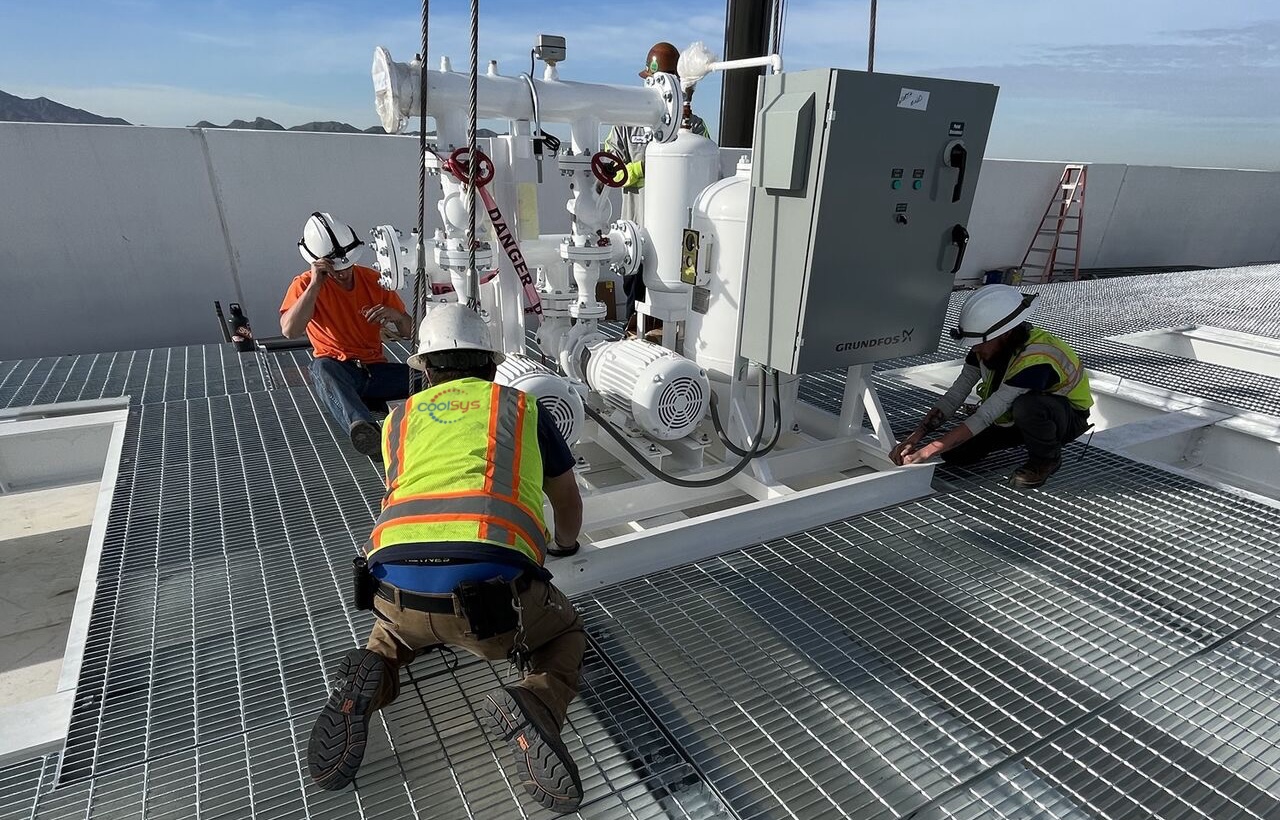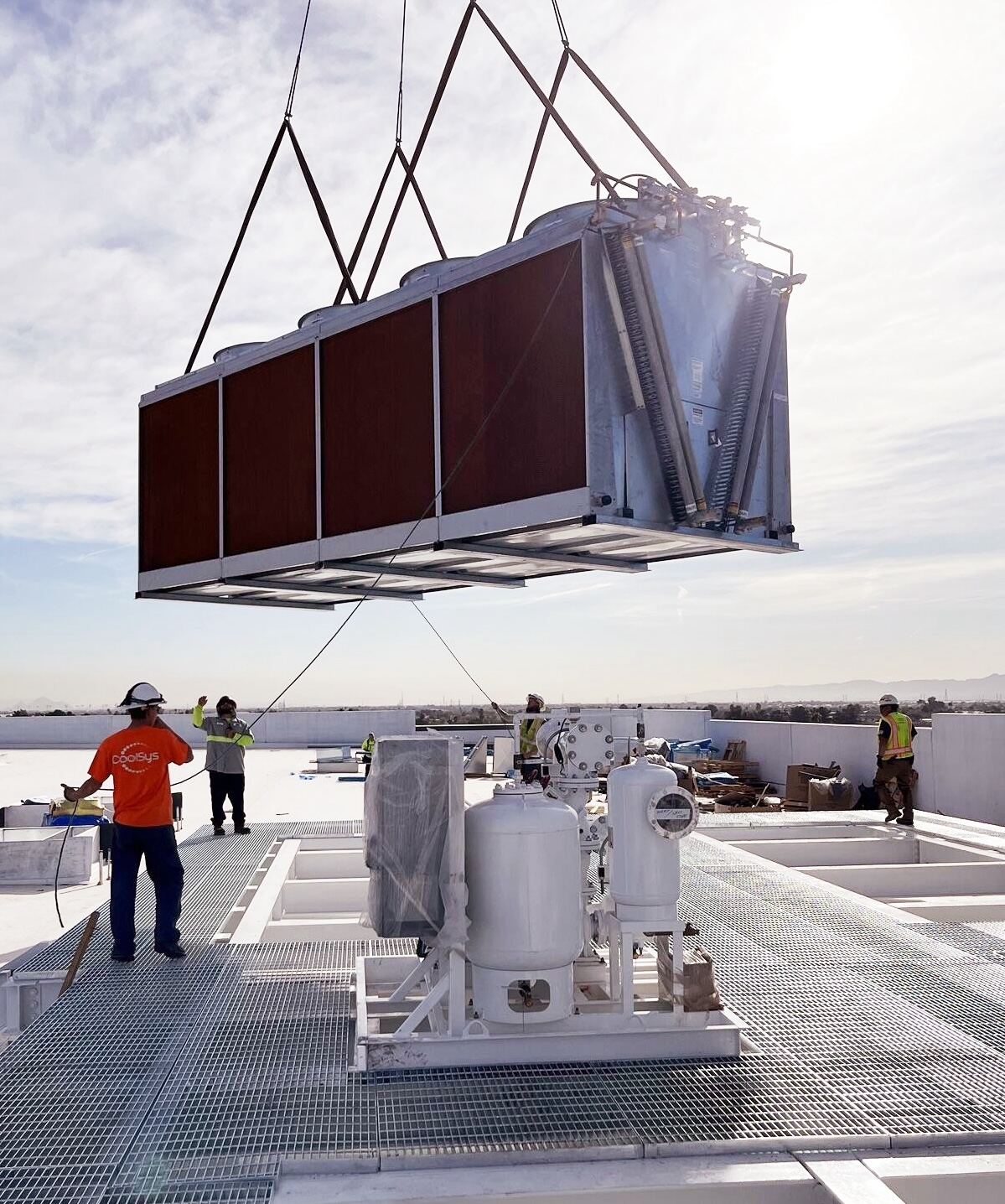MEPR, Building Controls and Fire Alarm Engineering Services for a Groundbreaking Project
CoolSys Energy Design (CED) made a noteworthy contribution to the rapidly growing field of sustainable buildings and natural refrigeration with its comprehensive engineering services—including MEPR, building controls and fire alarm—for one of the largest industrial kitchens and refrigerated fulfillment centers in North America. The project encompassed a new, 325,000-square-foot, first-of-its-kind facility for processing, cooking, freezing and shipping high-quality meal kits. Located in Goodyear, Arizona, the facility is also notable for its massive CO2 refrigeration system.
Engineering Challenge: The Sheer Size and Complexity of the Facility
The project was a highly complex undertaking, dwarfing the engineering design requirements for most industrial buildings. About half of the square footage consisted of refrigerated storage space and the other half a sophisticated food preparation and cooking area, requiring the engineering design of not only major appliances, equipment and fixtures but also hundreds of interconnected supply sources, including HVAC, electrical, water and plumbing.
Engineering Solution: Respond With Numbers and Expertise
CED assembled a multidisciplinary team of its most senior MEPR engineers and designers to lay the groundwork for later construction and installation. The team included lead engineers in each discipline, as well as a large group of engineers and designers working under the supervision of the leads.
325,000
Total Square Footage
160,000
Refrigerated Square Footage
40
Packaged HVAC Units
78
Evaporator Coils
325,000
Total Square Footage
160,000
Refrigerated Square Footage
40
Packaged HVAC Units
78
Evaporator Coils
Engineering Challenge: Health and Safety Requirements for a Food Production Facility
The food preparation aspect of the project presented its own engineering challenges. With raw proteins and other ingredients coming into one section of the facility and cooked foods the product of other sections, food safety issues like cross-contamination were a major concern in the design of the rooms.


Engineering Solution: Precisely Controlling Air Flow
CED engineers designed pressure sensors, exhaust fans and supply fans to balance airflow among the rooms while compensating for air-conditioning, blowers and swinging doors. This ensures that air always flows from cooked to raw throughout the industrial kitchen to avoid contamination via air flow.
Engineering Solution: Precisely Controlling Air Flow
CED engineers designed pressure sensors, exhaust fans and supply fans to balance airflow among the rooms while compensating for air-conditioning, blowers and swinging doors. This ensures that air always flows from cooked to raw throughout the industrial kitchen to avoid contamination via air flow.

5
3,000A, 480/227V Electrical Services
16,000 MBH
Compressor Capacity
$1,000,000
Capital Avoidance Secured
4
Transcritical CO2 Sytems
5
3,000A, 480/227V Electrical Services
16,000 MBH
Compressor Capacity
$1,000,000
Capital Avoidance Secured
4
Transcritical CO2 Sytems
Project Challenge: Going Sub-Zero in the Desert
One of the greatest challenges CoolSys faced in both the design and implementation for the facility was its location. Until recently, it was considered folly to attempt a transcritical CO2 refrigeration system capable of reaching -10 ̊ F—and particularly one the size of this project—in the unhospitable climate of the Arizona desert, where summertime temperatures can reach 120 ̊ or more. It was widely believed to be impossible to create an energy-efficient transcritical CO2 system in such a hot climate. Those assumptions, however, have been proven wrong.
In contrast to the extreme summer heat, winter temperatures in the Arizona desert can drop to near freezing, requiring equipment that can handle outside temperature variations of 80 ̊ or more


CoolSys Solution: A Refrigeration System That Beats the Heat
To keep 18 rooms comprising approximately 160,000 square feet of refrigerated space in the massive facility at the required temperatures, CoolSys procured and installed four transcritical CO2 rack systems, totaling over 16,000 MBH of compressor capacity, in the building’s machine room.
Each of the four racks utilizes a rooftop adiabatic gas cooler to reject heat. In total, the system supplies refrigeration for 78 evaporator coils in the refrigerated sections of the building. CoolSys recommended adiabatic gas coolers for this project to enable efficient refrigeration performance in the desert. Adiabatic systems also use much less water—a precious resource in the harsh Arizona climate—than more conventional evaporative condensers.
The team also installed two adiabatic fluid coolers on the roof that provided condenser water to condensing units for eight blast chillers in the food preparation area of the facility. Inside the building, CoolSys installed 78 evaporator coils that supply refrigeration for about half of the 352,000-square-foot facility.
In addition to the rooftop systems and evaporator coils, CoolSys installed dedicated, packaged CO2 condensing units and associated piping for two food processing spiral chillers, as well as stainless steel piping, a building control system—including complete refrigeration system energy management—and leak detection in each refrigerated space.
CoolSys Solution: A Refrigeration System That Beats the Heat
In order to keep 18 rooms comprising approximately 160,000 square feet of refrigerated space in the massive facility at the required temperatures, CoolSys procured and installed four transcritical CO2 rack systems, totaling over 16,000 MBH of compressor capacity, in the building’s machine room. Each of the four racks utilizes a rooftop adiabatic gas cooler to reject heat. In total, the system supplies refrigeration for 78 evaporator coils in the refrigerated sections of the building. (The four gas coolers are pictured above.) CoolSys recommended adiabatic gas coolers for this project to enable efficient refrigeration performance in the desert. Adiabatic systems also use much less water—a precious resource in the harsh Arizona climate—than more conventional evaporative condensers.
The team also installed two adiabatic fluid coolers on the roof (one of which is in the photo above, left) that provided condenser water to condensing units for eight blast chillers in the food preparation area of the facility. The pump skids that circulate water to each condensing unit are in the foreground of the photo above, left, and in the photo above, right.
Inside the building, CoolSys installed 78 evaporator coils that supply refrigeration for about half of the 352,000-square-foot facility. (Pictured above, the team rigs one of the units.)
In addition to the rooftop systems and evaporator coils, CoolSys installed dedicated, packaged CO2 condensing units and associated piping for two food processing spiral chillers, as well as stainless steel piping, a building control system—including complete refrigeration system energy management—and leak detection in each refrigerated space.

Comprehensive Engineering Services
Licensed in all 50 states, CoolSys Energy Design possesses the expertise and experience to handle all building system engineering design tasks, conveniently offering a full range of engineering specialties under one roof. Customizable turnkey services encompass facility engineering, design, consulting, project management and commissioning for projects of all sizes, including massive, single-site facilities like the recent project in Arizona to coordinated multistate, multisite services.
Comprehensive Engineering Services
Licensed in all 50 states, CoolSys Energy Design possesses the expertise and experience to handle all building system engineering design tasks, conveniently offering a full range of engineering specialties under one roof. Customizable turnkey services encompass facility engineering, design, consulting, project management and commissioning for projects of all sizes, including massive, single-site facilities like the recent project in Arizona to coordinated multistate, multisite services.
Request a Quote or Learn More
To learn more about CO2 systems or to request a consultation, we invite you to complete the form below.

